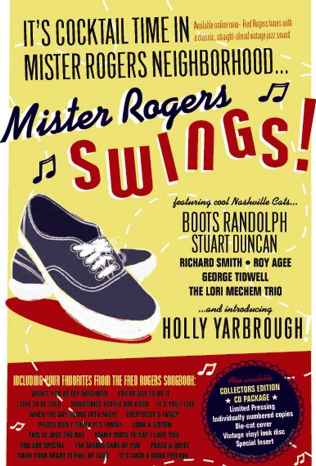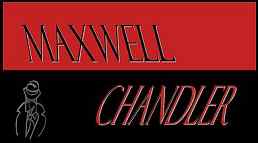
| Maxwell's page 24. | ||||||||||
Sharing the Joy: Holly Yarbrough’s “Mister Rogers Swings”

Growing up, both of Holly Yarbrough’s parents were artists. This meant that she had an untraditional, nomadic youth. In lieu of the typical steady friendships, Holly developed a special relationship with music. It was a source of comfort and inspiration with different songs to soundtrack every mood and activity.
After an odyssey which found her singing classical arias and performing and recording with her folk stalwart father, Glenn Yarbrough (“Baby, The Rain Must Fall” 1965) came the desire to discover her own artistic voice and way.
She found herself in Nashville immersing deeply into the local jazz scene and participating in jazz workshops.
It was in Nashville among an inspiring and supportive community that Holly decided to finally record as leader. Keeping with her philosophy that all music should have elements of intimacy and create an emotional response Holly chose the music of Fred “Mister” Rogers for its inherent joy called forth in the zeitgeist of most people’s childhood memories.
The album’s initial description would make it seem a thing of kitsch or at best an ironic thing for hipsters to put on during a cocktail party. Not at all, aside from the words to the well known “Won’t You Be My Neighbor” this is a legitimate album free from all camp. Someone devoid of knowledge of Mister Roger’s music would just think it is a really good jazz album. An odd starting off point for a project, to be sure, but one which surprisingly succeeds.
Although this is the music of Fred Roger’s, the album is not meant to “teach life lessons”. It has been said that a good singer could sing the phone book and it would sound good. What could in other people’s hands come across as overly saccharine; works here. Throughout the album Holly’s voice gives off a sexy but fun vibe similar to June Christy in a good mood.
When the casual music fan thinks of Nashville it conjures up images of cowboy hats and lap steel players. There is actually a strong community of musicians who easily jump genres with great understanding of the various musical terrains upon which they tread.
Nashville is famous for its recording studios and music stores. Before recording began various vintage mics were tested. This worked to great advantage for the album, creating a warm ambient sound akin to how the Verve label late 50’s recordings sound. Here you get the best of both worlds; pristine sound but with that organic feel so often missing in newer recordings.
The core band for the album is the Lori Mechem Trio (piano, bass, drums) with guest stars on trombone, saxophone, fiddle, trumpet and cello. Holly met most of the players through the jazz workshop or contacts she made through them.
Both the sound and interplay of the band further emphasize that this is no mere ‘two listen then forget’ album. The band all play well off each other and with Holly. There is never a forced or phoned in moment.
The album has a unified feel but never at the risk of all the tracks being selfsame. The album clocks in at a little under an hour. The mark of a good album, the time passes by quickly. While I enjoyed the entire album, there were some definite standout moments for me.
The first track, the well known theme song “Won’t You Be My Neighbor” shows off the fullness of the horns with Richard Smith’s classic sounding hollow body jazz guitar. Here, on Holly’s opening shot she shows that this is no mere hobby for her. It is nice to see the trend of up and coming singers actually singing, not doing that talk-sing and not over selling it, the “American Idolization” of singing. Her time singing in other genres has given her the ability to create a sort of intimate, hushed intensity.
“You’ve Got to Do It” has plunged wah-wah horns. Their joy is perfectly matched by buoyant dancing piano of Lori Mechem. This album was also one of the last recorded appearances by the popular saxophonist Boots Randolph. Here he provides a honking blues soaked solo, the ghosts of a thousand honky tonk juke boxes smiling down with approval.
“I Like to be Told” adds a sultry component to the album. Here is Mister Rogers with a martini in his hand, breaking hearts. Without overacting or burying the original intent the song is subtly changed in Holly’s hands. There is a laconic blues, the piano softly tinkling in the spirit of the best saloon songs.
“Sometimes People Are Good” starts off with a duet between Roger Spencer’s brightly colored bass and Chris Brown’s snappy brushwork. There is a great guitar break which embraces aspects of country swing and Charlie Christian. This track best illustrates the album’s over all theme of cheer. Happiness without the faintest whiff of cheese. Even though it is a trio with guest stars added there is a cohesiveness to the interplay among the musicians that allows for no short cuts to have to be taken in arrangements or improvisations.
“It’s You I Like” begins with a wistful piano and hushed vocals. It comes across as a torch song without being bogged down in lack of subtlety. Being just piano and vocals, it shows the trueness of not only the talent to be found on this album but the fullness of sound. The pacing is spot on leaving no sonic holes for the listener’s attention to fall through.
Sound aside another distinguishing thing about this album is the packaging. Instead of going with a diamond case and glamour shot cover photo there is a well constructed cardboard triple gate case, the center panel of which holds the CD. It has that vintage album cover look to it and is very well made. Each CD case is numbered with no liner notes but a postcard reproducing the album art work.
“When Day Turns To Night” is a light samba with George Tidwell’s muted trumpet meshing with Holly’s sustained vocals. In keeping with the samba spirit the song is lightly peppered with some acoustic guitar which practically makes one feel the beach sand under feet. Both the lyrics and arrangement of the piece give it a sort of timeless feel, it sounds as if it is a standard.
The album over all is happy but manages to switch emotional gears; although always within the realm of the positive. When called for, Holly’s vocals have a romanticism without an overly burning immediacy which would effect the delightful organic sense of tension. The slow smolder makes Holly’s magic all the more potent.
Jazz has commercially become marginalized. Long ago rock replaced it as the music of youth and rebellion. And now even with rock, things ain’t what they used to be. The budgets and attention go to pop confections which have little more importance or staying power than that of flavor of the month. The bottom line has largely won out. Anyone thinking outside the box must release their works independently or play the game. An advantage of Holly’s first project being so left of field is that she prevents any kind of artistic/stylistic branding or pigeon holing. With interviews and promotional materials she will not be forced into a role by some marketing department, adopting a persona “Earth mother”, “The Bluesy one” et al. There was also great foresight in not trying to promote the album as a quirky thing as it is a true thing of beauty merely birthed from a quirky idea. This album allows one to visit an old childhood friend in a new way.
Mister Rogers Swings (Vintage Disc)
Holly Yarbrough-vocals
Richard Smith-guitar
Lori Mechem-piano
Roger Spencer-bass
Chris Brown-drums
Roy Agee-trombone
George Tidwell-trumpet
Boots Randolph-saxophone
Julie Adams-cello
Stuart Duncan-fiddle
More information:
Maxwell will return with more adventures in sound
![]()
| Click Here |
Page one of Max's Jazz reviews
